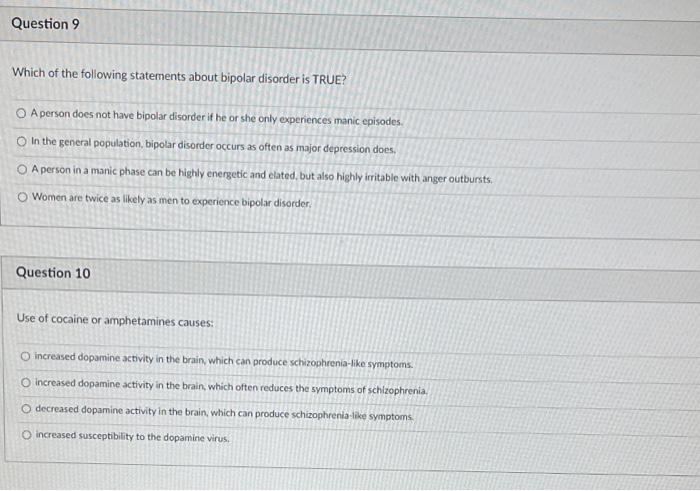Which of the following statements is true of bipolar disorder? Bipolar disorder, a complex mental health condition characterized by alternating episodes of mania or hypomania and depression, is a topic that warrants thorough examination. This article delves into the various aspects of bipolar disorder, encompassing its definition, types, causes, diagnosis, treatment, prognosis, impact, and ongoing research.
Understanding the intricacies of bipolar disorder is crucial for fostering empathy and reducing the stigma associated with mental illness. By shedding light on its complexities, we can empower individuals and their loved ones to navigate the challenges and triumphs that accompany this condition.
Definition and Overview: Which Of The Following Statements Is True Of Bipolar Disorder

Bipolar disorder is a mental illness characterized by alternating episodes of mania or hypomania and depression. During manic or hypomanic episodes, individuals experience elevated mood, increased energy, and decreased need for sleep. In contrast, depressive episodes are marked by low mood, loss of interest in activities, and feelings of hopelessness.
Bipolar disorder is diagnosed based on specific criteria Artikeld in diagnostic manuals such as the Diagnostic and Statistical Manual of Mental Disorders (DSM-5). The disorder affects approximately 1% of the population and can occur at any age, although the average age of onset is in the late teens or early adulthood.
Types and Characteristics

There are several types of bipolar disorder, including:
- Bipolar I disorder:Characterized by episodes of full-blown mania, which can last for at least one week, or mixed episodes that include symptoms of both mania and depression.
- Bipolar II disorder:Characterized by episodes of hypomania, which are less severe than manic episodes, and episodes of depression.
- Cyclothymia:Characterized by alternating periods of hypomania and mild depression that do not meet the criteria for full-blown bipolar disorder.
Causes and Risk Factors

The exact cause of bipolar disorder is unknown, but it is believed to be caused by a combination of genetic, environmental, and neurobiological factors.
Genetic factors:Bipolar disorder tends to run in families, suggesting that genetics play a role in its development. However, the specific genes involved have not been identified.
Environmental factors:Certain environmental factors, such as childhood trauma or stress, may increase the risk of developing bipolar disorder.
Neurobiological factors:Studies have shown that individuals with bipolar disorder have differences in the structure and function of certain brain regions, particularly those involved in mood regulation.
Diagnosis and Assessment

Bipolar disorder is diagnosed based on a clinical evaluation that includes a review of the individual’s symptoms, medical history, and family history. The clinician will also use diagnostic criteria from the DSM-5 to make a diagnosis.
Differential diagnosis is important to rule out other mental health conditions that may have similar symptoms to bipolar disorder, such as schizophrenia, depression, or substance use disorders.
Common Queries
What are the main symptoms of bipolar disorder?
Bipolar disorder is characterized by alternating episodes of mania or hypomania and depression. Symptoms of mania or hypomania may include elevated mood, increased energy, racing thoughts, decreased need for sleep, and impulsive behavior. Symptoms of depression may include persistent sadness, loss of interest in activities, changes in appetite or sleep, and feelings of worthlessness or hopelessness.
What causes bipolar disorder?
The exact cause of bipolar disorder is unknown, but it is thought to be caused by a combination of genetic, environmental, and neurobiological factors. Family history, certain life events, and brain chemistry imbalances may all play a role in the development of bipolar disorder.
How is bipolar disorder treated?
Treatment for bipolar disorder typically involves a combination of medication, psychotherapy, and lifestyle interventions. Medications such as mood stabilizers, antidepressants, and antipsychotics can help regulate mood swings and prevent episodes. Psychotherapy can help individuals learn coping mechanisms, manage stress, and improve their overall well-being.
What is the prognosis for bipolar disorder?
With proper treatment, most people with bipolar disorder can live full and productive lives. However, the course of the disorder can vary, and some individuals may experience more severe or frequent episodes. Early diagnosis and treatment can improve outcomes and reduce the risk of complications.